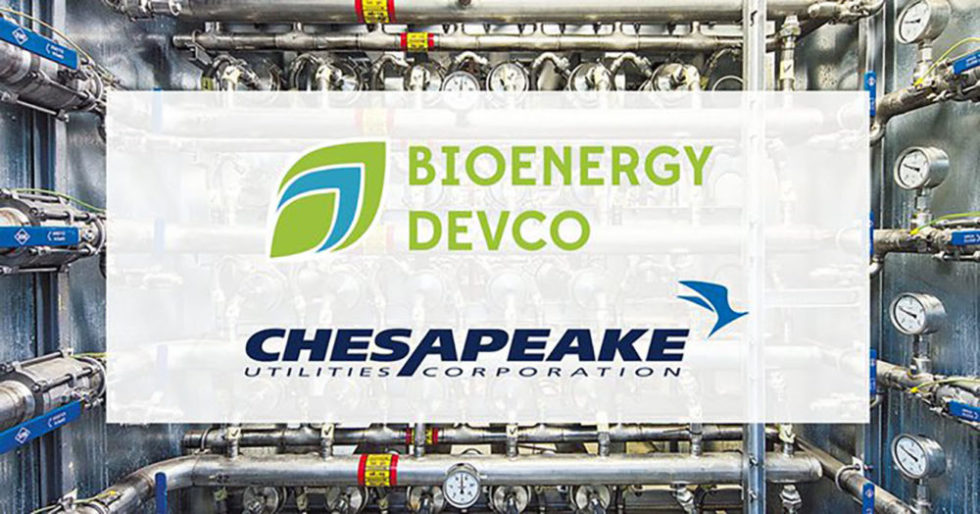Greener Investment Toward a Sustainable Future

Though the concerns over climate change vary by region and country, as an energy delivery company, we are familiar with the significance of reliable, efficient and clean energy. Our commitment to our stakeholders and as part of our environmental responsibility, we continue to identify solutions for more efficient energy use, generate savings for our customers and reduce carbon emissions within our business operations and the communities we serve.
Through this sustainable strategic approach, we have entered the renewable natural gas market which presents the Company, our customers and communities with multiple opportunities. The first such opportunity is the recent announcement of the agreement between Chesapeake Utilities and Bioenergy DevCo (BDC), a leading global developer of anaerobic digestion facilities that creates renewable energy and healthy soil products from organic material. Chesapeake Utilities, along with ESNG and Marlin Gas Services, will collaborate with BDC on this project in addition to several other project sites where organic waste can be converted into a carbon-negative energy source. This joint initiative will bring renewable natural gas (RNG) to Chesapeake Utilities’ service territories on the Delmarva Peninsula to help fuel homes and businesses, increasing environmental benefits and supporting a more sustainable future.
The resources generated from organic waste at BDC’s anaerobic digestion facilities in Delaware will become utility-quality RNG once it is processed by a $6 million gas processing plant that Chesapeake Utilities Corporation will build in Seaford, DE. ESNG and Marlin Gas Services will also make incremental investments associated with the transport and receipt of RNG for multiple suppliers, totaling approximately $7 million. These investments include an interconnect facility and additional transport equipment.
In October, 2019, ESNG filed an application with the Federal Energy Regulatory Commission (FERC) to include biogas utilization and standards in its tariff. ESNG had proposed changes to its gas quality specifications that would enable it to accommodate RNG at various receipt points on its system. The tariffs became effective as of November, 2019, per FERC approval. In response to interest from several renewable natural gas producers and given customer interest, ESNG’s system will be permitted to provide an interconnection for the injection of RNG production, with possible RNG sales to Chesapeake Utilities and Sandpiper Energy, and the need for a virtual pipeline solution, utilizing the services of Marlin Gas Services. Marlin Gas Services will transport the RNG to ESNG’s interstate pipeline, where it will be introduced to Chesapeake Utilities’ own distribution system and ultimately distributed to its natural gas customers.
While each opportunity that advances our RNG strategy is unique, there are three main common attributes, as follows:
- Environmental benefits result from relying on RNG as it is derived from organic waste materials from farms, landfills and wastewater treatment plants. RNG provides a clean energy delivery alternative. The biogas produced from the waste materials is processed and purified to create RNG that is fully interchangeable with conventional natural gas.
- Current and ongoing RNG initiatives will involve several of the Company’s business units which play key roles in the process.
- The terms of the agreements with third-parties provide long-term financial value and a more sustainable future for our local communities as well as for the Company’s shareholders.
 Pictured is the site in Seaford, DE, where Bioenergy DevCo and Chesapeake Utilities will build a gas processing plant for renewable natural gas.
Pictured is the site in Seaford, DE, where Bioenergy DevCo and Chesapeake Utilities will build a gas processing plant for renewable natural gas.


What is RNG?
Renewable natural gas (RNG) is biomethane – purified or upgraded biogas.
What is biogas?
Biogas is made from the decomposition of organic material. This organic material can be any biological material.
What is the benefit of optimizing biogas?
Biogas has an additional benefit when created from waste material – food, yard and livestock manure; wastewater treatment plants; and landfill gas. When these waste materials decompose naturally, they produce biogas, releasing methane and carbon dioxide, the two most prevalent greenhouse gases in the atmosphere.
These waste materials can be captured and processed by anaerobic digestion, where microorganism break down the organic matter to create methane-rich biogas, which is RNG. The biogas is then cleaned and upgraded to meet natural gas standards. RNG may then be injected in natural gas pipelines and used interchangeably with conventional natural gas. This process not only captures the methane and carbon that would otherwise be emitted into the atmosphere but the resulting gas may then be used as a reliable source of energy and offers customers an important renewable option to address their carbon footprint.
Source: Environmental and Energy Study Institute, Converting Waste to Energy, www.eesi.org.